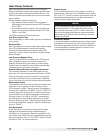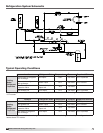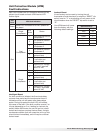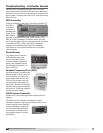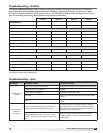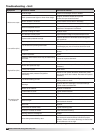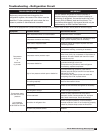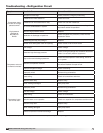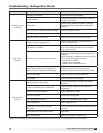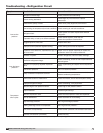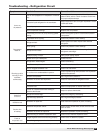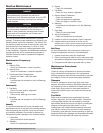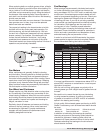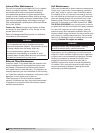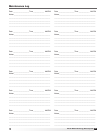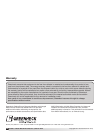
37
Model ERCH-HP Energy Recovery Unit
Belt Span
Deflection =
Belt Span
64
When replacing belts on multiple groove drives, all belts
should be changed to provide uniform drive loading. Do
not pry belts on or off the sheave. Loosen belt tension
until belts can be removed by simply lifting the belts off
the sheaves. After replacing belts, insure that slack in
each belt is on the same side of the drive. Belt dressing
should never be used.
Do not install new belts on worn sheaves. If the sheaves
have grooves worn in them, they must be replaced
before new belts are installed.
The proper belt setting is the lowest tension at which
the belts will not slip under peak load operation. For
initial tensioning, set the belt deflection at 1/64-inch
for each inch of belt span (measured half-way between
sheave centers). For example, if the belt span is 64
inches, the belt deflection should be 1 inch (using
moderate thumb pressure at mid-point of the drive).
Check belt tension two times during the first 24hours of
operation and periodically thereafter.
Fan Motors
Motor maintenance is generally limited to cleaning
and lubrication. Cleaning should be limited to exterior
surfaces only. Removing dust and grease buildup on
the motor housing assists proper motor cooling. Never
wash-down motor with high pressure spray. Greasing
of motors is only intended when fittings are provided.
Many fractional motors are permanently lubricated for
life and require no further lubrication.
Fan Wheel and Fasteners
Wheels require very little attention when moving clean
air. Occasionally oil and dust may accumulate on the
wheel causing imbalance. When this occurs the wheel
and housing should be cleaned to assure smooth and
safe operation. Inspect fan impeller and housing for
fatigue, corrosion or wear.
Routinely check all fasteners, set screws and locking
collars on the fan, bearings, drive, motor base and
accessories for tightness. A proper maintenance
program will help preserve the performance and
reliability designed into the fan.
Fan Bearings
Most bearings are permanently lubricated and require
no further lubrication under normal use. Normal use
being considered -20ºF to 120ºF and in a relatively clean
environment. Some bearings are relubricatable and will
need to be regreased depending on fan use. Check your
bearings for grease zerk fittings to find out what type
of bearing you have. If your fan is not being operated
under normal use, bearings should be checked monthly
for lubrication. Shaft bearings are the most critical
moving part of a fan. Therefore, special attention
should be given to keeping the bearings clean and well
lubricated. Proper lubrication provides for reduction in
friction and wear, transmission and dissipation of heat,
extended bearing life and prevention of rust.
In order for a lubricant to fulfill these tasks, the proper
grease applied at regular intervals is required. Refer to
the recommended bearing lubrication schedule:
If unusual conditions exist—temperatures below 32ºF or
above 200ºF, moisture or contaminants—more frequent
lubrication is required.
With the unit running, add grease very slowly with a
manual grease gun until a slight bead of grease forms at
the seal.
Be careful not to unseat the seal by over lubricating
or using excessive pressure. A guide to the amount
of grease to be used is to ll 30% to 60% of available
space in the bearing and housing.
A high quality lithium based grease conforming to NLGI
Grade 2 consistency, such as those listed below should
be used:
In addition to lubricating the bearings at specified
intervals, set screws in the bearing collars should be
checked for tightness. A bearing collar which has
loosened will cause premature failure of the fan shaft.
Fasteners attaching the bearings to the drive frame
should also be checked.
Mobil 532 Texaco Premium #2 B Shell Alvania #2
Mobilux #2 Texaco Multifak #2 Unirex 2
Bearing Lubrication Schedule
for Plenum Fans
(Relubrication Schedule in Months)
Fan
RPM
Shaft Diameter in Inches
1
⁄2 to 1 1
1
⁄8 to 1
1
⁄2 1
5
⁄8 to 1
7
⁄8 11
5
⁄16 to 2
3
⁄16
To 250 6 6 6 6
500 6 6 6 5
750 6 5 4 3
1000 6 4 3 2
1250 5 3 2 1
1500 5 2 1 1
2000 5 1 1 .5
2500 4 .5 .5 .25
3000 4 .5 .25 .25
4000 3 .25 .25 .25
5000 2 .25 .25 .25



